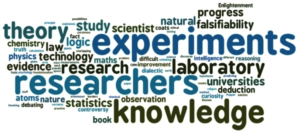Do you have a scientific attitude?
What does it mean to think like a scientist?
We all have beliefs about the world that affect our decision making.
Take the Philosophical Attitudes Survey This survey probes your core philosophical commitments about truth, nature, and how you practice science.
Take the Cognitive Styles Survey This survey provides a landscape of your unique cognitive styles about decision making.
Be sure to compare your profile with the general responses! As our database grows, we’ll update and customize the results summary as interesting trends emerge. Please let us know if you want to follow this work or help contribute.
If you want to know more about what we are doing:
Experimental philosophy is a multidisciplinary approach that combines philosophical inquiry with experimental methods traditionally associated with psychology and cognitive science.
Philosophy of Science is generally concerned with how science works, scientific knowledge, what motivates scientists, and how they make decisions.
Experimental Philosophy of Science thus seeks empirical data on how key scientific concepts are understood by particular scientific communities and non-scientists to facilitate better knowledge development and dissemination.
For the Medical Device Community –> Advancing Science and Simulation
For the Biologically-Inspired Design Community –> Communicating Biologically-Inspired Science
~~~
“In this age of specialization men who thoroughly know one field are often incompetent to discuss another. The great problems of the relations between one and another aspect of human activity have for this reason been discussed less and less in public. When we look at the past great debates on these subjects we feel jealous of those times, for we should have liked the excitement of such argument. The old problems, such as the relation of science and religion, are still with us, and I believe present as difficult dilemmas as ever, but they are not often publicly discussed because of the limitations of specialization.”, Richard Feynman
Learn more about the Philosophy of Science:
http://www.nfillion.com/index.php/teaching/5-341-philosophy-of-science
Learn more about experimental philosophy:
https://plato.stanford.edu/entries/experimental-philosophy/
Learn more about the Toolbox Project at:
http://tdi.msu.edu/
Robinson et.al., “Experimental Philosophy of Science and Philosophical Differences across the Sciences”:
https://www.journals.uchicago.edu/doi/abs/10.1086/703553
Boschetti et.al., Assessing attitudes and cognitive styles of stakeholders in environmental projects involving computer modelling
https://www.sciencedirect.com/science/article/pii/S0304380012003766

